In the Southern Pacific Ocean, a remote volcanic island looms out of the sea with giant stone statues called Moai. The Easter Island Statues are as mysterious as they are famous. Located on the island of Rapa Nui (Aka Easter Island) one can’t help but wonder, who put these giant stone heads on Easter Island and what was their purpose?
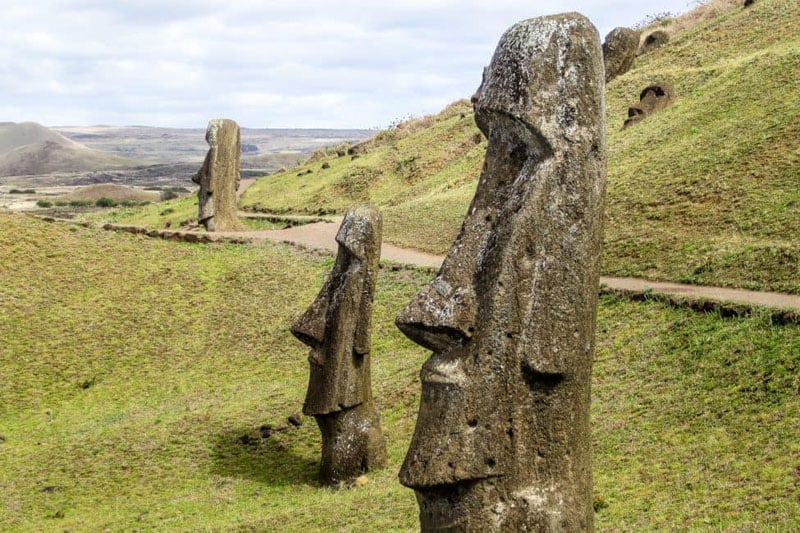
Table of Contents
The Mysterious Easter Island Statues
The island is famous for its stone head statues called Moai scattered throughout the park. It is believed that there are some 900 statues and 300 ceremonial platforms on the island. The Moai statues range in height from 2 m (6.5 feet) to 20 m (65 feet)
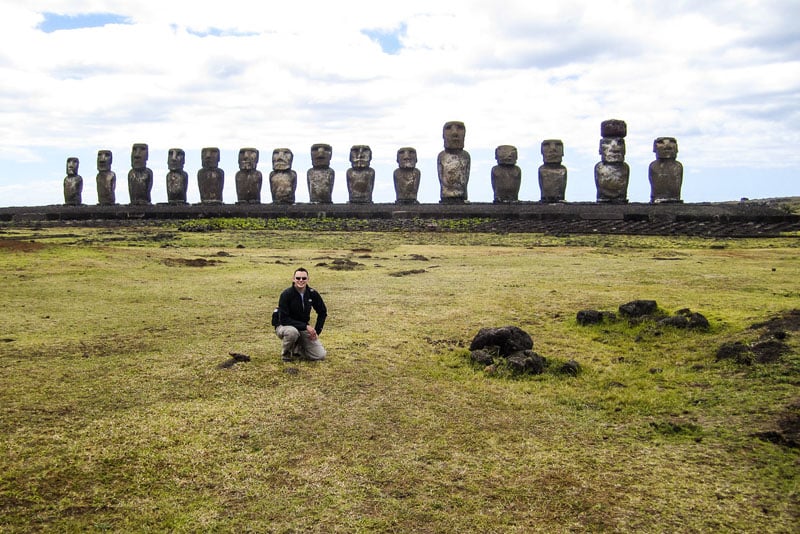
Once you appreciate the size and scale of these massive stone sculptures you begin to wonder; Who put them here? What purpose do they have? How did they transport them across the sea? Mark is on the trip of a lifetime to discover where this isolated civilization came from and where they went.
When you first see a Moai statue you are drawn to its disproportionately large head (compared to body length) and that is why they are commonly called “Easter Island Heads”. They are one of the most fascinating archeological sites to see and we are going to break down everything you need to know about visiting Rapa Nui
How to Get to Easter Island (Rapa Nui)
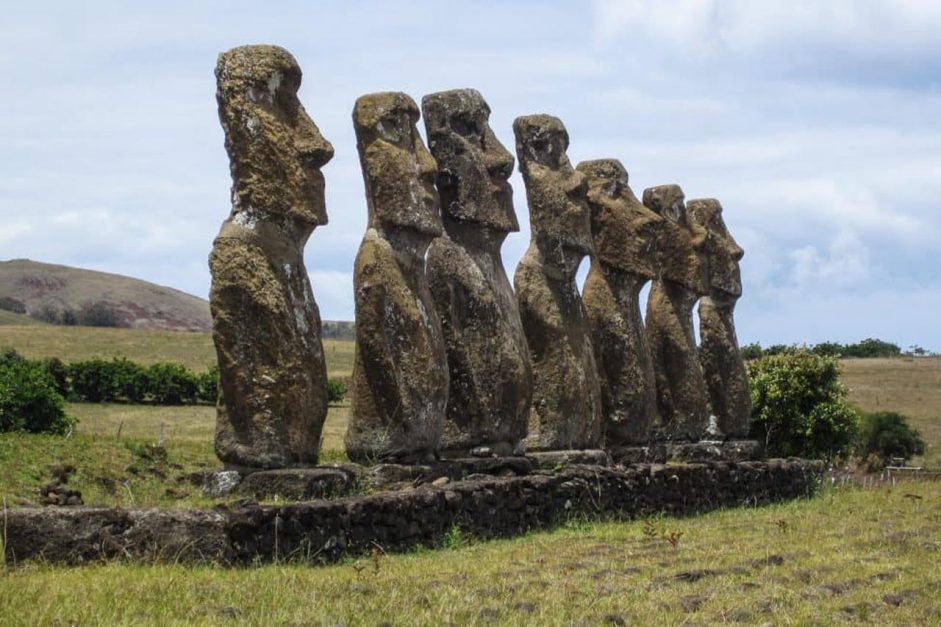
Easter Island (Rapa Nui in Polynesian) is a remote island in the southern Pacific Ocean. In fact it is the most remote inhabited island in the world. We have it on our list of most isolated places.
The only way to get to Rapa Nui is by plane. LATAM Airways (formerly LAN) operates flights from Santiago (Chile), and it is a 5-hour flight across the Pacific Ocean.
Stepping foot on the island you will find most accommodation offerings in Hanga Roa, a short drive from the airport. Hanga Roa is the only town on the island and you will find that public transport is non-existent here.
How to Get Around Rapa Nui
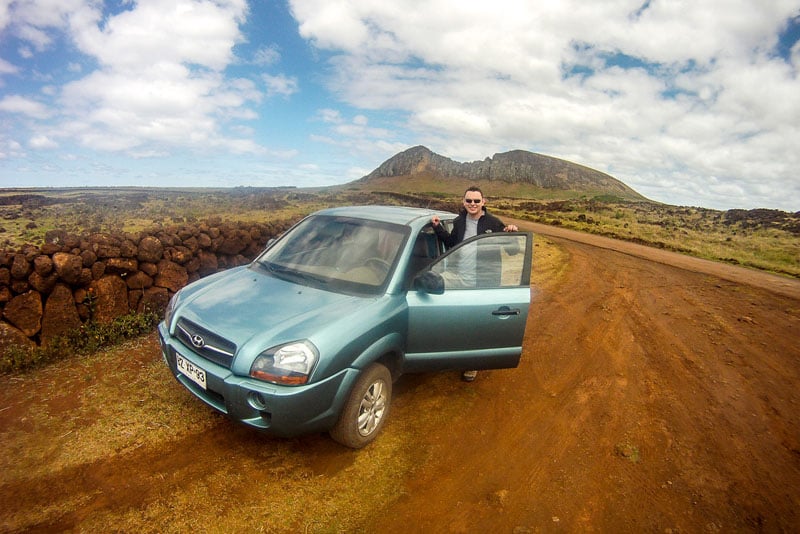
The best option for getting around is to hire a car, and you can arrange this with most hotels or guesthouse owners. I strongly recommend this as opposed to a tour bus; after all, this is one of the most remote islands in the world. I find that sense of remoteness central to the Easter Island travel experience.
Once you’ve got your vehicle, collect a map from the ranger station (along with the park entrance fee) and the whole island is laid before you to explore. I chose to drive anticlockwise, heading east along the southern coast road. You can easily circumnavigate the whole island in a day. You can view my Easter Island map here.
Moai Nursery at Rano Raraku
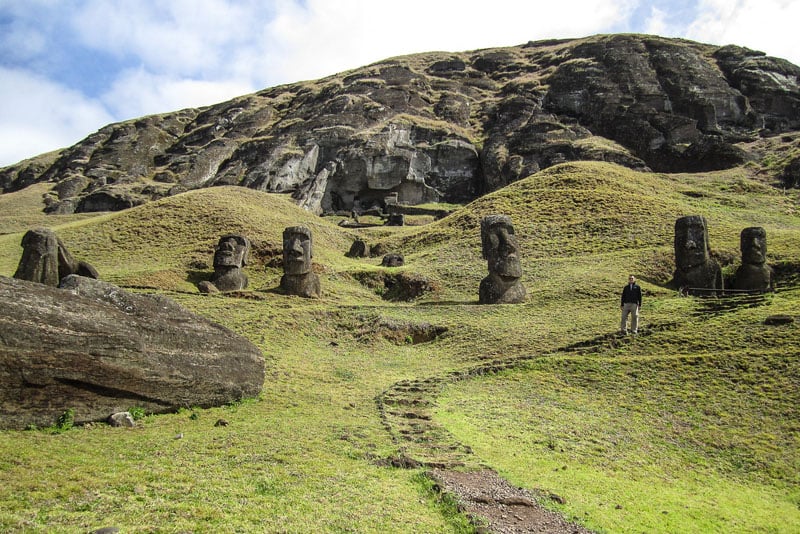
Rano Raraku is known as the “nursery” of the stone head Moai statues. As you approach the site from the road you will begin to see the giant heads dotted along the hillside. Look closer and you will find examples of Moai at each stage of development; much like a manufacturing line.
There are statues only partially carved out of the slopes of this volcanic crater, and others fully complete ready for transport to their final destinations. All but 53 of the 887 Moai statues were carved from this tuff (compressed volcanic ash).
The mind boggles that humans from a stone-age civilization could carve such massive statues from rock and transport them around the island, one thousand years ago. A stunning archaeological discovery was made in May 2012, where archaeologists excavated around the statues to discover the Easter Island heads have bodies!
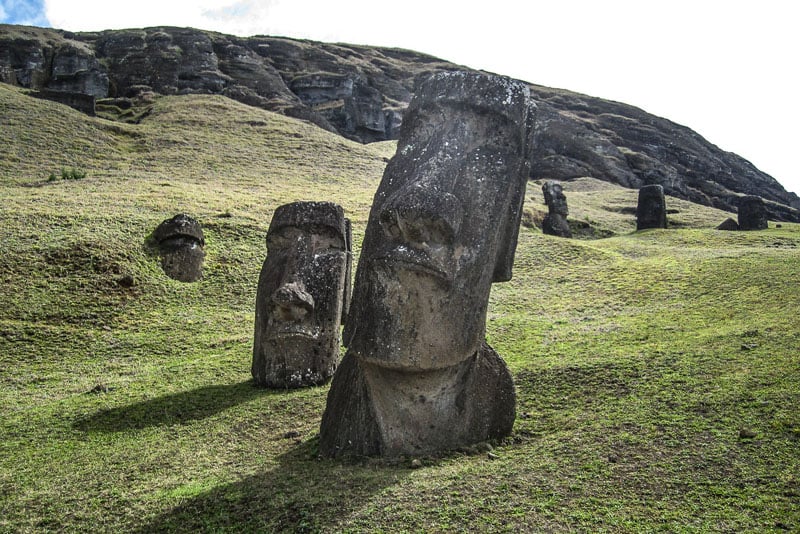
You can climb to the top of the crater from where you will get an almost 360-degree panorama of the island.
Ahu Tongariki
A short drive away and you will arrive at Ahu Tongariki, which is the most photogenic of the statue sites. “Ahu” are village burial sites defined by a large flat stone platform with a seaward vertical wall. You will notice that the statues here all have their backs to the sea; they’re all facing inland.
Why? Well, let’s answer the first question:
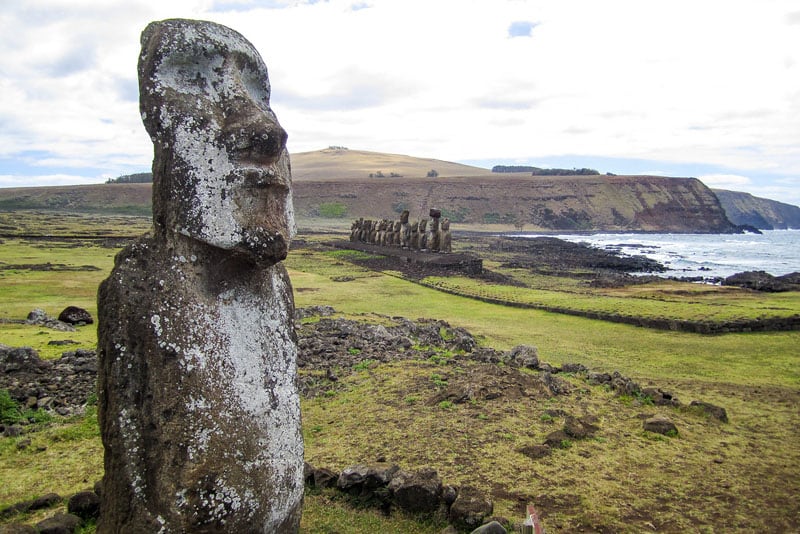
So who put the Easter Island statues here?
It is believed that it was the Rapa Nui people, Polynesians who sailed here from other pacific islands in Eastern Polynesia that put the Easter Island statues there. Although other theories suggest that they could have arrived from South America.
The colonization of Easter Island began around 1000AD, although dates differ from archaeological evidence versus radiocarbon dating.
What purpose do the statues of Easter island Have?
Archaeologists suggest that the statues were a representation of the Polynesian people’s ancestors. The Moai statues face away from the sea and toward the villages, by way of watching over the people.
So here at Ahu Tongariki, these Moai look over a flat village site. But not all Moai face inland, and we’ll get to an example of this later on our journey around Rapa Nui.
Pukao Topknots
“Pukao” are the hat-like features or topknots which are on top of some statues. They were made from a quarried red volcanic stone. These are actually later additions to the statues, possibly as late as the 16th century.
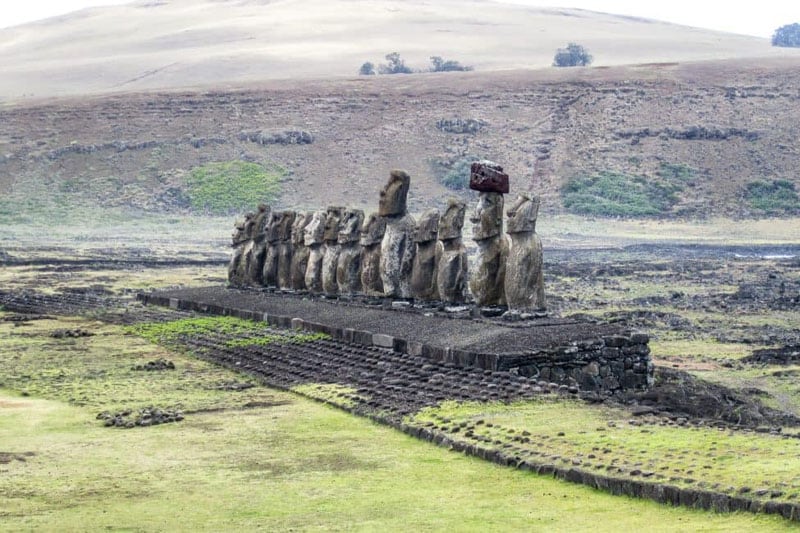
The reason for these hat-like additions is not known but some theories suggest it gave the statue an expression of power.
The “Top Knot” reflects a male hairstyle which was common on Rapa Nui. These have been re-erected here at Ahu Tongariki.
You might think the statues here at Ahu Tongariki have stood here since they were originally erected, but they have an interesting story to tell; All of the Moai here were toppled over during the island’s civil war. And later in the twentieth century a tsunami hit the coastline and swept them inland.
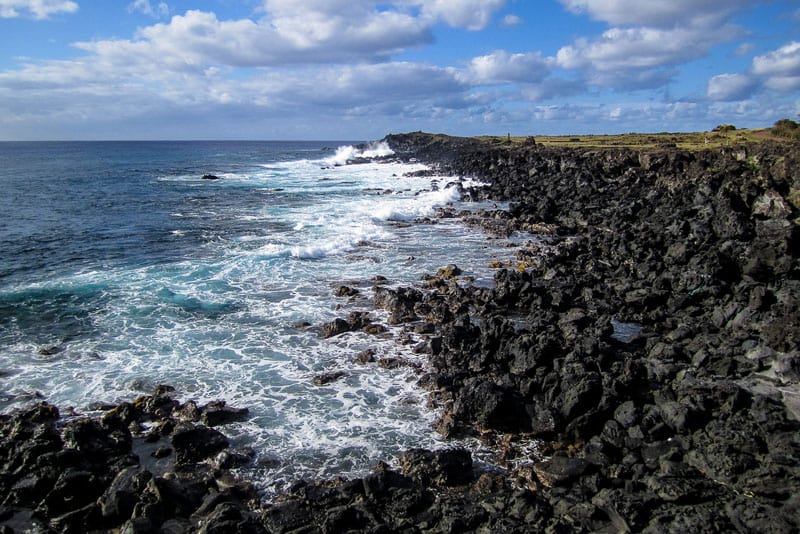
The “statue-toppling” occurred in the 1750s by tribes that were locked in civil war.
Historians know roughly when the toppling took place because in the 1700’s the first European visitors reported seeing only standing statues, but then by Captain James Cook’s visit in 1774 many were reported toppled.
Anakena beach
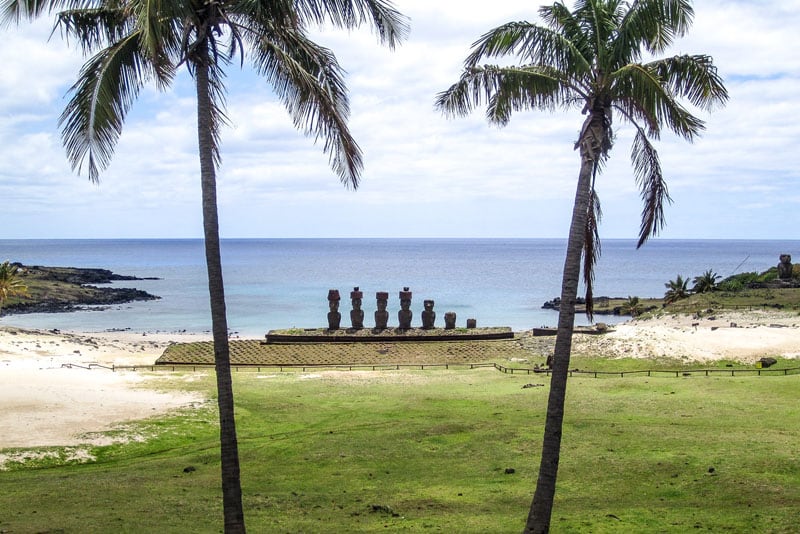
Continuing our circumnavigation of the island, takes us west along the north shoreline to Anakena beach. This white-sand beach flanked with swaying palm trees is one of my favourite beaches in the world; Rugged, remote and restful.
The focus of your attention as you walk down to the beach is Ahu Nau Nau, a group of 7 Moai silhouetted in front of the calm turquoise waters of this secluded bay.
Ahu Akivi
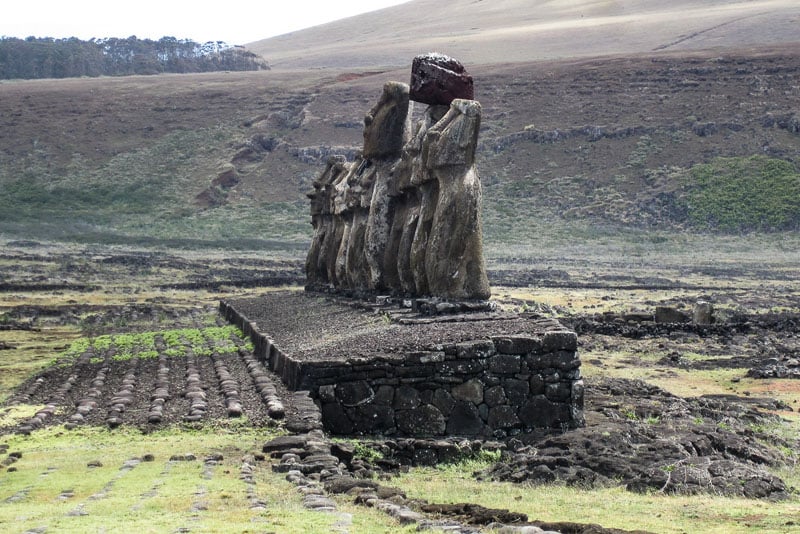
Venturing towards the west coast now, we arrive at Ahu Akivi, which is unique because these Moai are the only ones to all face towards the sea, although it does overlook a village site too. A theory suggests these Moai looking out to sea are to help travelers find the island.
Ana TePahu – Cave Dwelling
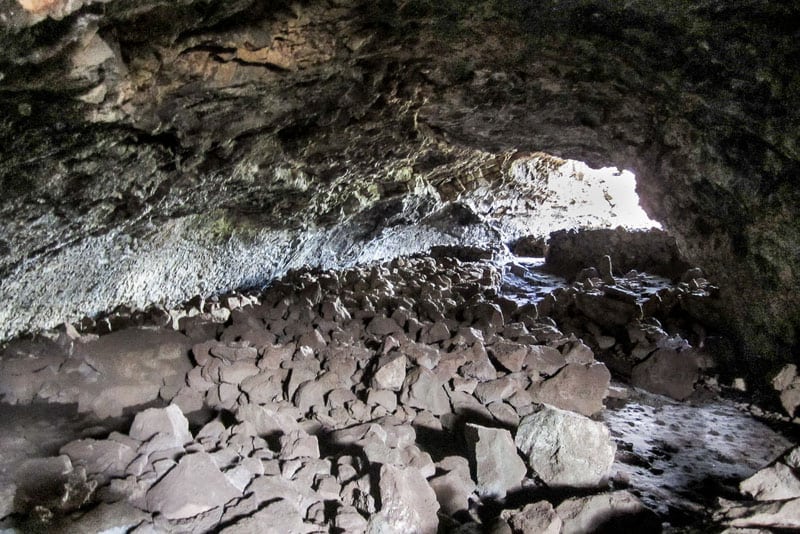
Just close to here is Ana TePahu, which once was a cave-dwelling. Access has now been restricted because of the risk of collapse, so I was fortunate to visit it before the restriction.
This cave is actually a lava channel, formed from the volcanic eruptions that led to the creation of Easter Island. This lava tube runs the length of 7km.
Ahu Akapu Moai have Eyes
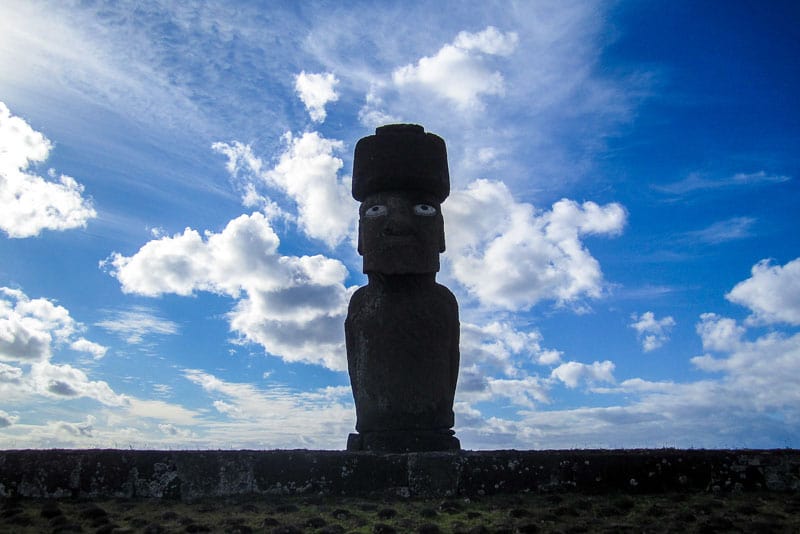
You may have noticed that most Moai statues have just plain faces. Some we learned have the “Pukao” topknot hats. But interestingly a discovery was made from broken fragments of coral found at many of the Moai sites.
Archaeologists reassembled these fragments to form these white coral eyes with black or red coloured pupils. These fit into the eye sockets designed for this purpose.
How did they transport the statues around the island?
The answer is no one really knows. There are various theories that revolve around the use of wooden rollers or sledges and ropes to pull the statues along. Google “easter island aliens” and there are some interesting theories of alien spaceships transporting the statues!
Rano Kau Crater
Finally, no visit to Easter Island would be complete without visiting the volcanic crater at Rano Kau.
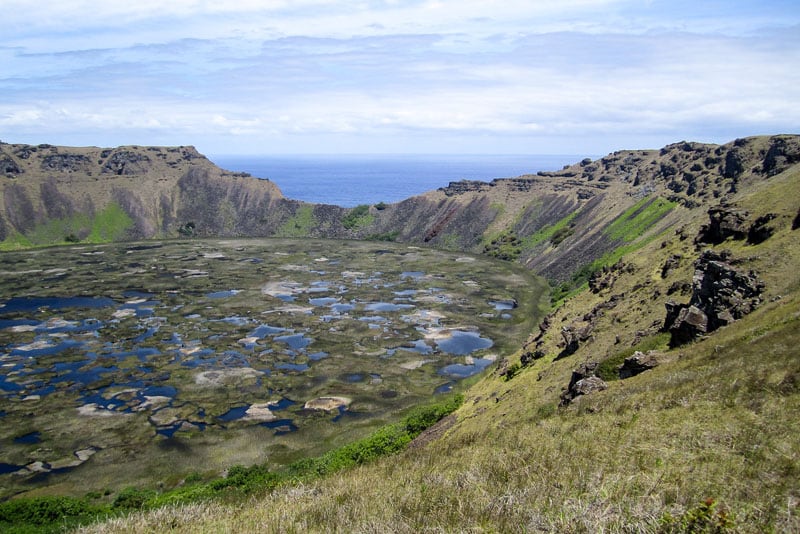
The Orongo Ceremonial Village, sits on the slopes of this extinct volcano crater. The stone dwellings here are from the “Birdman” era.
The annual Birdman competition (Tangata Manu) was held here. Competitors had to climb down the cliffs and swim out to the small island at Motu Nui.
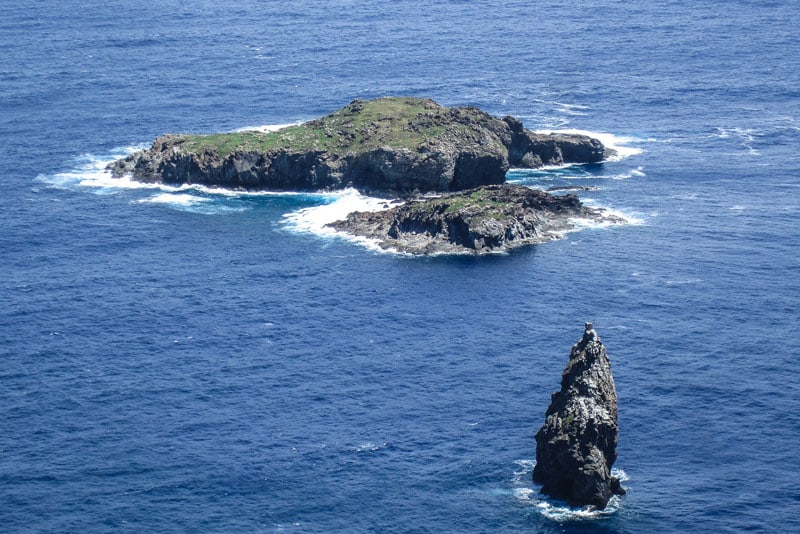
They would have to collect a fresh egg from the manutara bird and then swim back and climb the cliffs to the village.
The winner of the competition was the first person to return with an intact egg. This winner would then become the King for the year.
Easter Island as an example of human frailty?
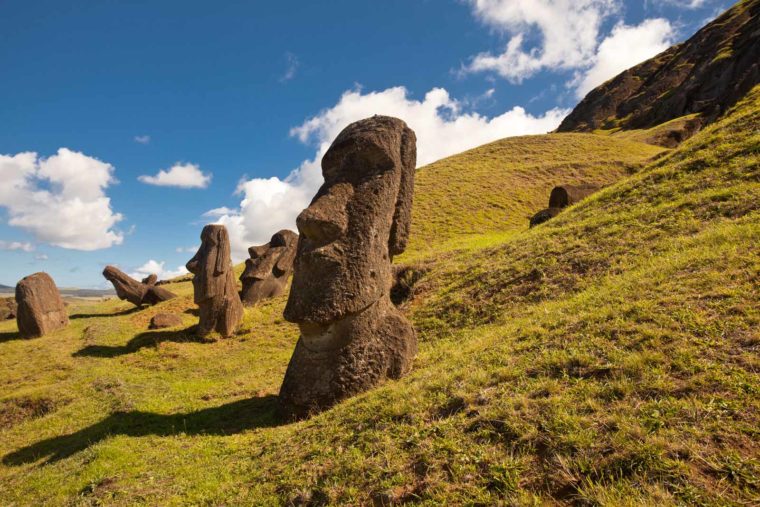
Could the vulnerability of Humanity be expressed through the history of Easter Island?
Here we have a remote civilization that overexploited its natural resources to destruction, as one theory suggests.
However, another theory suggests that the arrival of the European settlers introduced disease and slavery, bringing about their downfall.
I’m inclined to believe the second of these theories. Professor Stephen Hawking said this about the downfall of civilizations:
“If you look at history, encounters between civilizations with advanced versus primitive technologies have gone badly for the less advanced.”
Professor Stephen Hawking
About Rapa Nui National Park
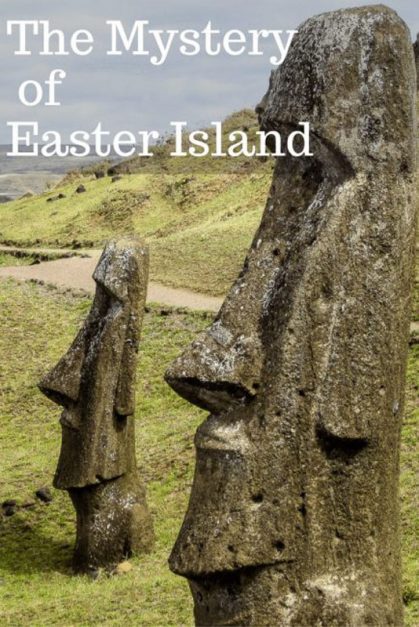
Rapa Nui National Park is a UNESCO World Heritage Site that covers nearly half of the area of the island of Rapa Nui and its four nearby islands. It is located 3700 km off the coast of Continental Europe and there are two weekly flights from Santiago, Chile.
For more about Chile, read Why Chile is the perfect adventure travel destination.
Do you have a question about flying you’ve always wanted to ask an airline pilot?

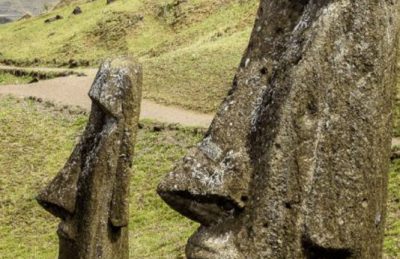
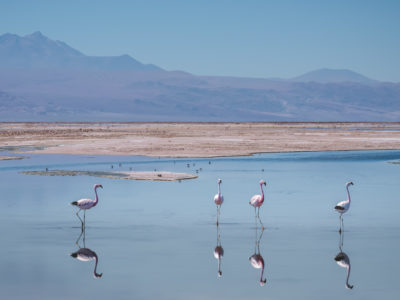
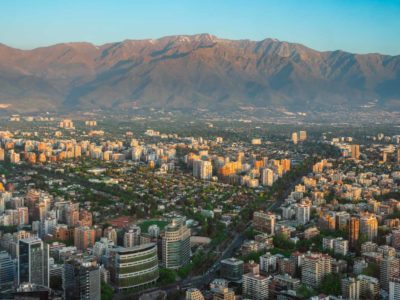
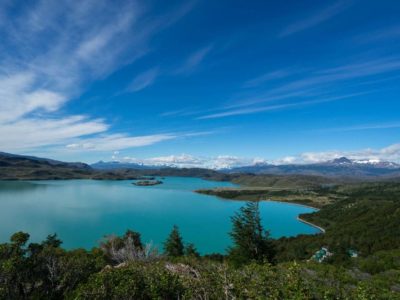
Good stuff! learned something new here. thank you for sharing the nice information.
This is an awesome place to travel and the sunset looks too good in our camera shots.
We want to celebrate our festival on this again!
Amazing post!
Just purchased a Moai replica for our pool area in Mexico. After reading this great web page we have decided that Easter Island is a MUST SEE destination! Thank you for the inspiration.
Excellent knowledgeable articles about Easter islands.
Definitely on my chrismas 2019 list!!!
There’s another theory that states that the 7 statues looking away from the island come from an island 3,000 miles away in which they had to escape from the natives that were cannibals snd believed that by eating them, since they were much more intelligent, that they would acquire all their knowledge.
Lots of similarities snd ideas that make sense from 2 islands 3,000 miles apart…
A lot to think about….
Just Wow.
A very captivating and informative blog, I will surely visit Christmas Island one day, awesome place of wonder and curiosity..
Nice blog for kids who are interested in archeology and it would make young archaeologists and evn they may solve the mystery behind these huge rock’s which had an ancient carvings in it t may even be clue that aliens lived in ancient Egypt may even have some signs under earth about the first known alien starch child
Wow! Interesting topic and would like to visit and see those statues in the future.
i’m really got surprised to see that how could be this be possible that a statue of human faces are located …i thought that these are the landmarks of ancient time’s and the author really did a brilliant job to let the whole world know about these specific attributes
Wow! Awesome pics of the island.I really want to visit this place.Thanks for Sharing this Post.
Really mysterious ……
Very Informative blog, gain a lot of knowledge from it and the pictures are truly inspiring.But I am a bit confused about the mystery of Easter Land, Could anyone explain in detail about it ?????
I think I may have a good idea off the statues purpose. They are all ona volcanic island, the have bodies buried in the ground. Maybe they were used to measure the lava flow. That could be why they are facing the flat city. They are the warning to leave if the volcano ever blew…
Interesting Article. I wondered the same in my younger age for the Easter Island Statues. But, it was really an unveiling of a mystery when I got to know the real reasons. Chile is a beautiful place for such wanderers like us. I have also read an another article as interesting as this one. https://tango.tours/12-exciting-reasons-visit-south-america/ It was a great source of information for learning more about South America and especially about Chile. 🙂
Interesting article, and very captivating and vivid photos. It seems like a really great place. Thanks for sharing.
Hey ! How did they carve and structure those rocks ? It’s really awesome. Thanks.
Easter Island is on my bucket list! There is something about the Pacific Islands that I just cannot get enough! I wish it was easier to Island Hop here, but we will get here with the kids soon! Thanks for sharing!
such a good artical nice photos and good information
What a place..awesme..Definitely I visit someday..very nice place
Very good text, congratulations
Really interesting article.
I had no idea it was even possible to travel to Easter Island. The impression I get from documentaries was one of a tiny uninhabited rock.
I’m adding it to the bucket list.
Pete
Hello,
The information given in this blog is great but we often read this on many travel websites. But he discuss some new things about the island. The quality and quantity of pictures about Easter Island are awesome too. The author brings more interest of readers when he includes the Anakena beach. In short it is a good post having great collection of pics. I Love it.
Hey, me here. :^ )
I was always really wondering how the easter statues had managed to get to this island, and how they were formed. It’s marvellous to finally find out the history behind them. As a year 8 high school teacher, I’m sure my students would love to hear about something like this as it has been discussed in class quite a lot in the past few months or so. I’m very appreciative to discover new things on this incredible website, and I’m glad you’re here to help contribute to it as it’s both mine and my class’
Thank you so much Mark for the information here! I really do appreciate it.
:^ )
-Mrs Turner
Great post and beautiful pictures. The Statues looks amazing, surely an interesting place to visit. Thanks for sharing 🙂
Nice pics of the island. I want to visit the island and i will go to the Easter Island someday.
Great, that place is looking so beautiful and statues are one of the best attraction. that place is full with natural things and so stunning photos you shared.
Discovered a new & mysterious Island through your amazingly crafted blog post. What else I could say? It is not only written beautifully but these professionally taken pictures make me feel like I am the part of the environment.
Hey ! Thanks for the post. I enjoyed it. 🙂
Easter island is still mistery and yes it should be on anyone travel wishlist. The photo that you were taken are stunning and by just looking at your picture it make us all want to visit it one day.Driving along the island will surely become new experience and someone who do it may feel like lost in somewhere you don’t know. Thank you for sharing very useful post, and if we never visited that place at least we have seen it through your photos.
This is definitely a place I would like to visit some day. Those images of Easter Island just make me want to go there and explore. Very cool.
Wow! I love your photos. I’ve seen a million Easter Island photos, but these are INSANELY good.
Hi Renuka, Thank you. Easter Island should be on everyone’s wishlist, it’s such a magical Island, and somewhere you can genuinely feel remote and isolated from the world; Which itself instils a sense of purpose, wonder and awe about the world we live in. I believe that’s what the first Polynesian settlers discovered a millennium ago. Too bad the arrival of the Europeans brought about the downfall of their isolated civilisation. Mark
Wonderful photos and what a writing skill you have.
Oh! what place and how nicely you described the place. I really want to visit this place. Thanks for this awesome, excellent and very helpful post.
Beautiful photos and an interesting account. Easter Island looks really fascinating, and I’d definitely like to visit it someday.
You have very technical stuff and it gives me information. Thank you
This was one of the most useful reads I have ever come across. All the images of statues and information was wonderful. I was just surprised how much information you packed into one blog post. Awesome article and amazing way of writing…